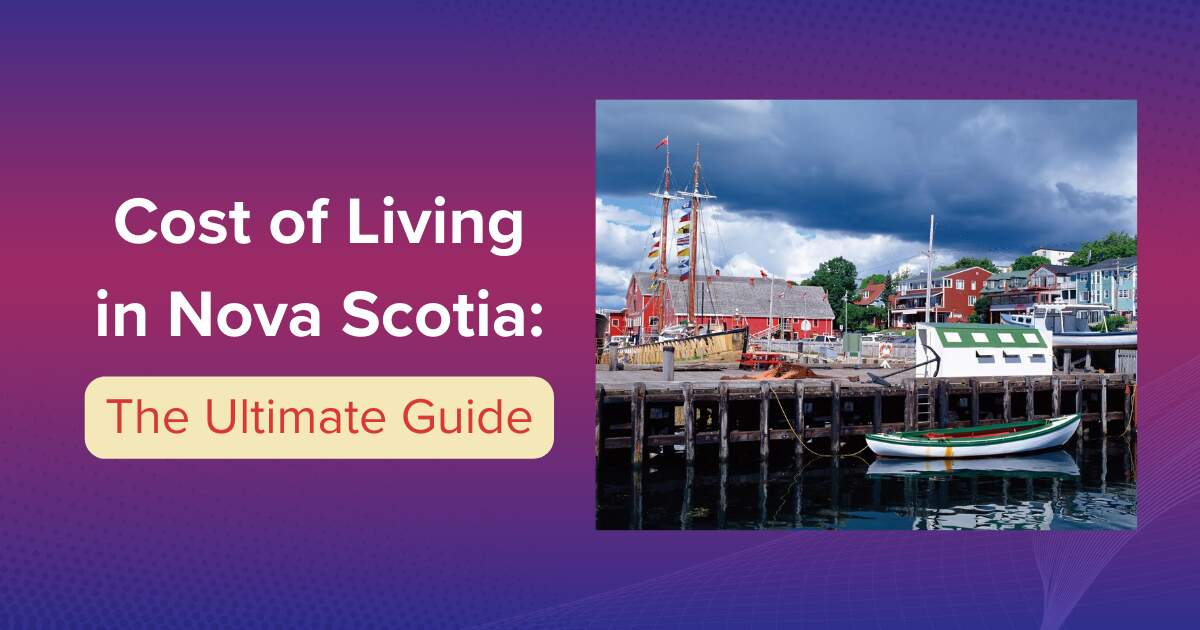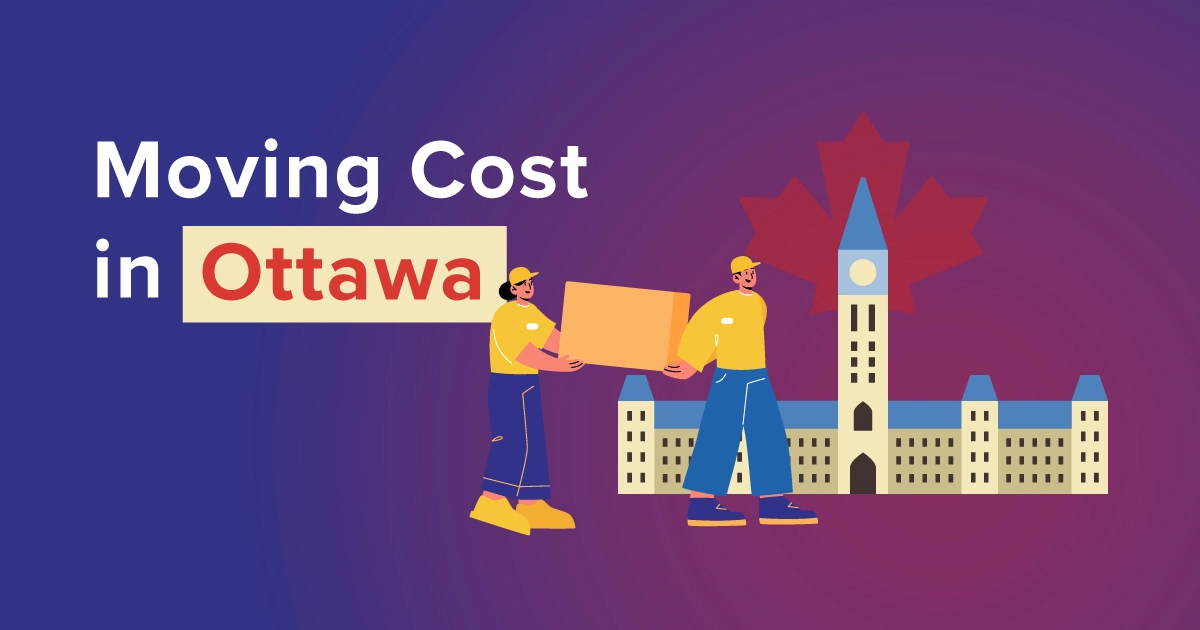Nestled along the stunning Atlantic coastline of Canada, Nova Scotia offers a unique blend of natural beauty, cultural richness, and a welcoming community. As individuals consider relocating or simply exploring the financial landscape of this maritime province, understanding the cost of living becomes important.
According to our research, one person’s average monthly cost of living in Nova Scotia is approximately $2,500 to $3,000. This estimate includes housing (rent or mortgage payments), utilities, groceries, transportation, healthcare, entertainment, and other miscellaneous costs, like hiring cleaners, Halifax movers, or lawn care.
What living in Nova Scotia will cost you depends on your lifestyle choices, location within the province, and other personal factors.
This article breaks down the cost of living in Nova Scotia, covering everything from housing to everyday expenses. Let’s dive into what it takes to make a living in this beautiful corner of Canada.
1. Housing Costs in Nova Scotia
In Nova Scotia, putting a roof over one’s head is less expensive than in larger provinces where housing costs are rising rapidly.
With just over one million residents, Canada’s second-smallest province is wee in landmass and population. The provincial government hopes to hit two million, but not before 2060. Halifax’s largest city has just under half a million people, making it seem dwarf-like compared to Toronto, Montreal and Vancouver.
People moving to Halifax or elsewhere in Nova Scotia will be happy to know that home ownership here is cheaper and rents are lower.
Sebastian Jania, owner of real estate solutions and investment company Ontario Property Buyers, says, “The average cost of owning and renting in Nova Scotia can vary widely because there are some very high-demand cities and then some much smaller low-demand towns.”
Average Rent In Nova Scotia
On average, one can expect to pay over $1,600 for a two-bedroom apartment. This number goes up significantly more when renting a single detached house, which would cost over $2,000 a month.
However, the median rent for all bedroom counts and property types in Halifax, the capital of Nova Scotia, is $2,200. This is a significant increase compared to the previous years.
The Average Amount To Own A Home In Nova Scotia
On average, one can expect to pay over $400,000 for a home in Nova Scotia. Remember that these costs can vary depending on the location within Nova Scotia and the type of housing
Samantha Odo, a sales representative from Precondo, worked in Nova Scotia’s real estate market for two years before moving to Toronto.
He told us that for those interested in owning a home, the average home price in Halifax-Dartmouth is $530,900. It is important to note that the real estate market in Halifax offers many choices for different types of buyers and is much more affordable compared to other major Canadian cities.
2. Cost of Utilities in Nova Scotia
Whether you own a home or rent in Halifax, utility bills are essential to your monthly household costs. Precondo’s Samantha Odo tells us that the average price of utilities in Nova Scotia is $362.603 per month. That includes electricity, water, internet and a gas stove and fireplace.
How much are utilities in Nova Scotia?
Like most places, the cost of utilities in Nova Scotia depends on how much and when you use them.
For 1000 kWh from Nova Scotia Power, a home pays between $132.43 for off-peak hours, and $205.20 if the electricity is used mainly in peak hours. To manage costs, using an electric or natural gas heat pump is one of the cheapest ways to heat a home. Natural gas can cost about $112 per month for an approximately 1,000 sqft home.
The typical home pays about $29 per month for water consumption and $45 per month for wastewater discharge. Water is almost always added to the rent for renters.
For internet, expect to pay at least $45 per month for a locally-based internet provider.
3. Buying Groceries in Nova Scotia
Although most groceries in Nova Scotia have skyrocketed lately due to higher fuel and transportation costs, there are still ways to balance a budget without depriving yourself of the grocery store.
According to Statistics Canada, meat prices in Nova Scotia (beef, chicken, and pork) were comparatively lower than in other provinces, while fish and seafood prices in this maritime province were surprisingly among the highest. Even the homegrown lobsters are going for $18 per pound these days.
Cost of buying weekly groceries in Nova Scotia
Some can get away with paying just $23 per week on groceries in Nova Scotia. Still, most of us happily pay more for snacks, specialty items, artisan goods, convenience items, or organic produce.
The cost-of-living database – Numbeo, lists the minimum cost of food per person in Halifax, Nova Scotia, as $526.28, or about $131.50 per week.
Here’s what $131.50 worth of groceries and a trip to an artisan bakery look like for someone shopping this week’s sale items at Atlantic Superstore.
| Product | This Week’s Sale Price |
|---|---|
| Pork loin | $6.47 |
| Marinated striploin steak | $13.70 |
| Chicken breasts | $12 |
| B12 Vitamins | $7.99 |
| 100g Columbian coffee | $8.99 |
| Red grapes | $8.71 |
| Frozen vegetables | $7.98 |
| Ice cream sandwiches | $9.99 |
| Cheddar cheese | $6.99 |
| Yogurt | $6.49 |
| Basmati rice | $4.99 |
| Tea | $5.99 |
| Chips | $2.99 |
| Canned port and beans | $1.29 |
| Frozen pizza | $2.99 |
| Juice | $4.49 |
| Canned salmon | $6.49 |
| Bananas | $1.96 |
On the weekend, you might want to pick up a freshly baked loaf of bread (~$6.25) and a Le Petit DeJeuner ($4.75) at Boulangerie La Vendéenne at the Halifax Seaport Farmers’ Market.
The total bill is missing one thing: the retail sales tax applied to many items you buy daily.
What is the tax on purchases in Nova Scotia?
Canada has three types of sales taxes that vary by province. In Nova Scotia, there’s the HST, set at about 15%, which applies to purchases of goods and services. That’s 5% GST combined with a 10% provincial sales tax.
While some items, like basic groceries and sometimes feminine hygiene products, are exempt from sales taxes, everything else will have tax applied at the checkout.
4. Transportation Costs in Nova Scotia
When calculating your transportation costs in Nova Scotia, budget for a car because living here without one is tricky. Whether you own, lease, or borrow a vehicle, you’ll need car insurance (~$75 per month)
Do you want to supplement your car or public transit usage with healthy bike rides when the weather permits? You must purchase a bike because Nova Scotia has no official ride-share programs. Bike rentals are available but cost about $50 per day.
Owning a car
In Nova Scotia, owning a car is necessary; with a car loan, ownership is accessible to most people. There are plenty of vehicles at all prices on the local used and new car market, so the choice is yours.
A 2021 Volkswagon Passat costs $22,977 on the lower end, while a 2022 Dodge Ram costs $85,995 on the higher end. If you own a car, you’ll need a two-year Nova Scotia motor vehicle permit ($143.30) and a separate motorcycle permit ($46.10 annually). If you buy a car second-hand from someone, the cost to transfer ownership is $13.20.
Do you know what to budget for the car you want? If you can’t pay for your vehicle in cash, you’ll need to make monthly payments on a car loan. Here’s a car loan calculator you can use to help you crunch the numbers.
Leasing a car
Leasing a car costs less per month, and the available choices are as varied as the options to purchase. In Nova Scotia right now, we found a 2024 Hyundai Essential for $298 per month, a Toyota Corolla for $390.80 per month, and a very chic 2024 Audi SQ7 SUV for $8,000 down payment and $1,520 per month.
Getting around Halifax without a car
While it would be challenging to live without a car in most places in Nova Scotia, in Halifax, it’s possible thanks to public transportation.
Halifax Transit is the city’s transportation system with buses and ferries ($2.75 for a single ticket or $18 for ten tickets) and Access-A-Bus services for residents in different areas. For a monthly cost of $82.50, you could replace the need for a car for inter-city travel.
Unless you routinely carry exact change on you, we recommend downloading HFXGO, Halifax Transit’s mobile fare payment app, and paying with your smartphone or buying passes at several ticket-selling retail stores.
Are you traveling with kids under 12? Their ride is free.
5. Eating and Drinking Out in Nova Scotia
The name Nova Scotia is Latin for “New Scotland,” reflecting the origins of some of the early settlers. You can find evidence of the province’s Scottish heritage in Nova Scotia’s pub culture.
Trust in the Nova Scotian donair for everyday, casual, budget-friendly (cheap!) eats. Its sweet sauce sets it apart from the block’s kebab or gyro. A medium donair at Tony’s Famous Donair and Pizza costs $10.75.
Yes, lobster is at peak price right now, but there are some budget-friendly seafood snacks among the food kiosks at a place we call the Salt Yards. For under $20, try the lobster roll at Dave’s Lobster or a 2-piece fish and chips ($9) from Katch, and finish with a Beaver Tail or a Gooey Mooey cone at Cows Ice Cream.
You may want to occasionally splurge on something like the Euro-Nova Scotian tasting menu at Oxalis ($188, with wine pairing), so keep an eye on how often you eat out. Cooking at home is still undeniably cheaper.
On a menu, the MP, usually next to items like seafood and some land meats, stands for “Market Price.” This means the item’s price can change daily depending on supply, demand, and seasonality.
It is OK to ask your server for the market price of your dish in cases where the price is MP, and the daily cost isn’t visibly written somewhere, like on a chalkboard.
6. Entertainment Costs in Nova Scotia
Enjoying the rugged and quaint beauty of Nova Scotia through its many lovely walking trails is free, but fully experiencing life in Nova Scotia will cost you money. Here’s about how much-
Music artists love coming through Nova Scotia. The audiences are always welcoming, and thanks to the province being an educational destination, it’s also full of young music lovers with money to spend on concerts. Catch Celtic Thunder at Scotiabank Centre for $42.50, Matthew Good at Casino Nova Scotia for $52.50, or get a pass to the Halifax Jazz Festival for $215.
One adult ticket to see the much-loved Symphony Nova Scotia starts at just $40, or $20 if you’re under 30. A show at the Mermaid Theatre costs $18.50-$30.
On the lower end, a ticket to one of the Cineplex theatres in Nova Scotia costs $14.99 plus tax. At the Maritime Museum of the Atlantic, you can learn about Nova Scotia’s connection to the Titanic and another marine history for just $5.15.
7. Comprehensive Health Insurance in Nova Scotia
In Canada, healthcare is mostly free, but you must purchase comprehensive health insurance in Nova Scotia to pay for the items that aren’t covered.
Nova Scotia Medical Services Insurance (MSI) is the provincial plan for insured medical services. MSI provides medical care coverage, including some dental and optometrist services.
Prices for this additional coverage take your age and your past and current health profile into consideration. At some workplaces, you may have a private health insurance policy provided through your employer-sponsored plan.
8. Hiring Movers, Cleaners, and Lawn Care in Nova Scotia
If you’re a homeowner in Nova Scotia, you’ll likely hire movers, cleaners, and lawn care services at least as needed.
Nova Scotia Movers
We suggest shopping around to find the best price for movers in Nova Scotia, where the competition is stiff. Get quotes from reputable companies, compare, and choose the best deal.
Remember, if you move to Nova Scotia to relocate for work, you can claim moving costs on your taxes. Another tip is to ask the moving company whether they offer lower rates on weekdays or in the middle of each month. Let’s Get Moving offers lower rates to anyone moving in Halifax between the 4th and 26th of each month.
Housekeepers and cleaners in Nova Scotia
In Nova Scotia, people sometimes hire housekeepers and cleaners to keep their homes neat, to clean before (or after) a big event, or to clean their rental before moving somewhere new. No matter the reason, the average cost of hiring a house cleaner is reasonable at $19 per hour or $2000 per month, depending on the cleaning’s size and intensity.
Lawn care and residential snow removal
The average cost of professional lawn care services in Nova Scotia is about $55 per hour and ranges from $30 to $80 per hour, depending on the frequency and type of services. For example, weekly lawn mowing services will cost less per visit than a once-monthly service.
Those same lawn care companies often switch to snow removal in the winter. Residential snow removal is priced similarly to lawn care, whether you hire your neighbour’s kid or a pro snow removal business in Nova Scotia.
Conclusion: What Will Life Cost YOU in Nova Scotia?
The cost of living in Nova Scotia reflects its unique blend of affordability and quality of life. Our analysis has shown that while certain expenses like housing and utilities are reasonable compared to larger Canadian cities, there are fluctuations in basic groceries, seafood, and imported items.
Despite rising costs, Nova Scotia offers diverse opportunities and experiences, from affordable housing options to vibrant cultural activities. Understanding the intricacies of the cost of living in Nova Scotia provides a comprehensive picture for those considering relocating or residing in this maritime province.


















